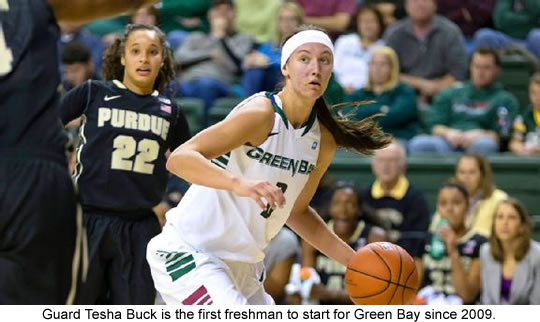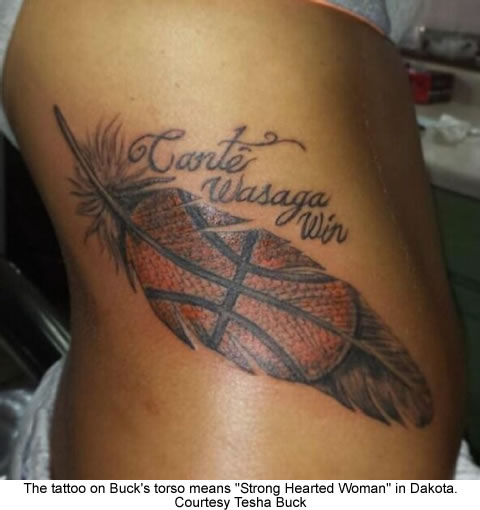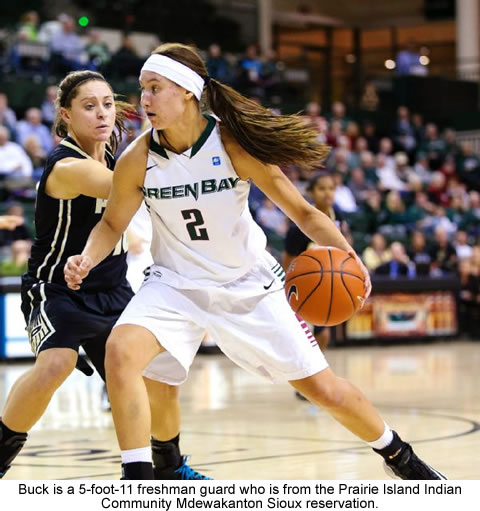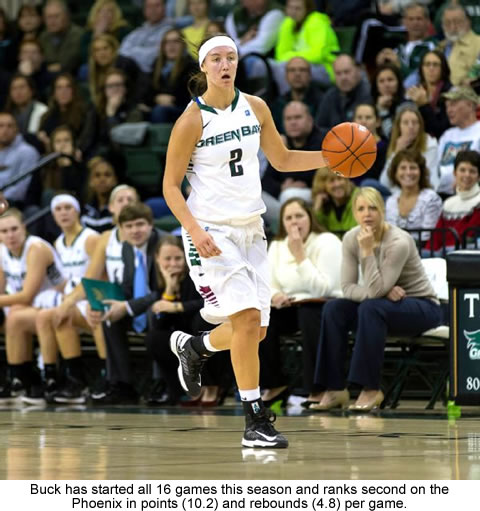 |
Canku Ota
|
 |
|
(Many Paths)
|
||
|
An Online Newsletter
Celebrating Native America
|
||
|
February 2014 - Volume
12 Number 2
|
||
|
|
||
|
Tesha Buck Embraces
Heritage
|
||
|
by Graham Hays - espnW.com
|
||
|
credits: unless otherwise
noted: all photos courtesy of Green Bay Athletics
|
|
GREEN BAY, Wis. -- Dave Muelken was mowing his lawn when Tesha Buck pulled her car into his driveway on a Thursday afternoon last summer. It wouldn't normally have been the kind of memory that lingered clearly. Buck played basketball for Muelken at Red Wing High School, six seasons for him, in fact, from the time she was a seventh-grader. She was friends with his daughters. She was a familiar figure. Most days, her arrival probably wouldn't have warranted much more than a wave. What made that afternoon different was that Buck wasn't supposed to be in Red Wing. She was supposed to be four hours away, settling in as a freshman at the University of Wisconsin-Green Bay. When Muelken asked her what she was doing back home, Buck couldn't hold back tears. She didn't think she could go back to Green Bay, she told him. She missed home, missed her family. She missed where she was from. She didn't love the game the same way she had in Red Wing. Tesha's father, Rich Buck, was with her younger brother at a baseball tournament in Memphis at the time. Rich had come home once, too. He left Lake Region State College, a two-year school in North Dakota, after one year there on the basketball team. He never went back. "I had heard she was on her way home," Rich recalled. "And in my mind I'm like, 'No, no, Tesha, don't do that; don't make that mistake.' I'm reliving what I did in the past. But I flat out just talked to Tesha and said with the decision you make, it's something you've got to learn to live with. "I tell her, to this day, it's still the hardest thing I ever have to do, year by year, watching my kids play basketball this time of year. Every year it comes back and haunts me. I just told her I didn't want her to have to live with that."
Late in the second half with her team badly in need of points to begin a rally, Tesha Buck caught a pass as she stood perhaps seven or eight feet beyond the 3-point line with two seconds on the shot clock. Contested, she nonetheless squared her shoulders and got off a pure shot, not a panicked heave. The ball made one full revolution around the rim and dropped through the net. Minutes later, she got the ball in transition on the left wing and pulled a move right out of "Top Gun," slamming on the brakes while a defender flew right by, then finishing a one-hander while her shoulders were almost even with the side of the backboard. Those efforts proved insufficient to prevent a rare home loss, but the response from the crowd made it clear what the locals thought of their freshman. Their cheers were a little bit louder when she succeeded. That much more air was expelled from lungs in lament when she made a freshman miscue. Their eyes followed her every move. Green Bay fans know special when they see it because they have experience seeing it. The Phoenix are a young team now, most of the players who led the program to the Sweet 16 and multiple second rounds of the NCAA tournament gone. But the fans see what's ahead. "On a program level, I think our fans need somebody like her," said Green Bay assistant coach Sarah Bronk, a holdover who has been on the bench alongside both current coach Kevin Borseth and former coach Matt Bollant. "It took one exhibition for our fans to go, 'Now it's your turn.' "She does a lot of things and our fans go crazy." That four-hour drive across Wisconsin and across the Minnesota state line to Red Wing awaited her parents that night, but in a gym empty save for a few people sweeping up the stands sometime after the game, Rich sat next to the court and explained what it was like to see his daughter out there. "It's actually pretty unreal," Rich said. "That's always been her goal since I can't remember. But I don't know, I show up at this place and watch her play and it really makes you want to tear up. I'm just super proud of her, and it's something that I couldn't accomplish as an athlete. "And to see her follow and fulfill her dreams and step on this court is pretty phenomenal." It isn't the end of the story. In some ways, it's only the beginning.
To understand her is to understand the universality of a father's influence on a daughter. Her struggles with separation from what was familiar are the same as those of freshmen across the country. So, too, her ability to eventually adapt and thrive in that new setting. It is a story of someone who aspires to live up to the words tattooed above an ink basketball on her torso: Strong Hearted Woman. To understand why that is only part of the story is to understand that "Strong Hearted Woman" is merely a translation of the words inscribed permanently on her skin. The words themselves are written in the Dakota language. The language of those who came before her. Of where she comes from. A language and a history rarely represented on Division I basketball courts. Data published by the NCAA on the race and ethnicity of its student-athletes reveal that 0.5 percent of women's basketball participants across all divisions during the 2012-13 academic year were American Indian or Alaskan Native. That equated to 82 women out of 16,186 playing basketball across all divisions. For Division I, the total was 23 women out of a total of 4,972 participants. Two of them were Jude and Shoni Schimmel, sisters from the Confederated Tribes of Umatilla in Oregon who rose to national prominence playing for Louisville and as subjects of Jonathan Hock's "Off the Rez" documentary that was released in 2011, during Shoni's freshman season with the Cardinals. They are the faces of a population long all but invisible in women's basketball, and the crowds that sometimes come from far and wide to see Louisville on the road speak to the importance of those faces. It is also important that they aren't alone, not completely. "I just want the younger kids to know that it's not a bad thing, it's not something you should be ashamed of, growing up on a reservation," Tesha Buck said. "But if you have talent to do something to get off of it, don't waste that. Because a lot of kids' parents may tell them there's nothing out there for you, you know what I mean? So if you have the mindset that 'I'm going to work as hard as I can, I'm going to do everything I can to use my talent to do big things in life,' I think that's really important.
When she was growing up, first on the Prairie Island Indian Community Mdewakanton Sioux reservation and later in Red Wing, Buck loved to watch Candace Parker as the Tennessee star led the Lady Vols to back-to-back national championships. But she also spent hours watching her dad and uncles play on local teams that would compete against teams from other reservations from across the Plains and Upper Midwest. She would travel with them and spend all day in the gym. The only chance to shoot a ball herself came during breaks in the action, but she just enjoyed being there around them and the games. She was good at softball, really good, but she loved basketball. Muelken was watching his daughter's fourth-grade game when he found his attention drawn to a nearby court and saw then-sixth-grader Buck doing things no sixth-grader he was familiar with could do. By the following year, she was playing minutes on his varsity team. By eighth grade she was starting. It wasn't always the easiest fit. Off the court, she was a middle schooler and approached life with the attention span and priorities thereof. But when the ball bounced, she was always in the moment. Buck described her dad as a "garbage player" who was willing to do the dirty work and get his points on offensive rebounds. Although the description seemed to leave him briefly bemused when relayed, she meant it as a positive assessment. Rich Buck played with a degree of competitiveness that has yet to fade. Beyond helping out as an assistant coach on the high school basketball teams in Red Wing, where Tesha's younger siblings still play, he is a professional men's softball player who has played for the United States national team. On the basketball court, Muelken coached against Rich and then played against him in some pro-am leagues before Tesha was part of the picture. "She definitely takes after her dad, athletically, emotionally," Muelken said. "I think Tesh would be the first to tell you, there were times we had to keep her in check. But it wasn't in a bad way, it's just that she is such a competitor. That's her dad all the way. She gets all that fight athletically from her dad. Not that her mom's not a fighter. But just on the court, how I know her dad, I see so much of Tesha in Rich or Rich in Tesha." Rich was raised by his grandmother on the reservation, but the family (Tesha's mother is not a member of the Mdewakanton tribe) moved into the town of Red Wing when Tesha was in elementary school. He said the relocation was about securing a better life for his kids and his concerns about some of the problems associated with the casino that opened on the reservation in the 1980s. They were not outliers. According to the State of Minnesota's Indian Affairs Council, as of 2007, only about half of tribal members lived on the reservation that shares land between the Mississippi and Vermillion Rivers near Red Wing with a nuclear power plant. There were occasional taunts and derogatory chants from fans during road games at rival schools, but unlike her dad, who said he encountered his share of prejudice growing up around Red Wing, some hateful and some just ignorant, Tesha said she experienced little that made her feel unwelcome. Much of her extended family was only 20 minutes away on the reservation, including the great grandmother with whom she was particularly close. Tesha was still a part of that culture in the way kids are everywhere, experiencing it without consciously studying it or thinking about it. Only as the years went on and she heard more about people like the Schimmels and began to see how her own community, as well as other Native American communities, reacted to her success on the court did she begin to seek it out. "I think she started to realize that whether she wanted to be or not, she was becoming a role model for a lot of those young kids in the Indian community here," Muelken said. "They really, really looked up to her. That's not always fair because she was 15 years old herself, just a kid, trying to be a role model. But I really saw her, her junior year and really her senior year, the maturity she had, that she realized then that was pretty special. That those kids were looking up to her and she had a chance to make a difference and be a role model."
"Any time these high school kids move away from home for the first time, it becomes extremely difficult for them, to make them feel this is home now for them," Borseth said. "That's kind of culture shock to a lot of kids to have to go through that. I think Tesha experienced a little bit of that to start with. But I think that's really when we got to know each other. She got to understand that I understand kids moving away, how they feel and what that means to them. I think the two of us grew as a player and as a coach and as friends during that period of time." He went on to label her as coachable a player as he ever worked with, a sponge who listens, processes and wants to learn. He then proceeded to outline in detail all the areas in which she remains defensively deficient as a freshman because, well, that's what he does. He also called her a special talent. She appears to be that. The first freshman to start for Green Bay since 2009, she is second on the team in points and rebounds and her nearly two-to-one assist-to-turnover ratio is evidence of the vision that everyone who talks about her seems to rave about. She isn't a special basketball talent because she is Mdewakanton. The bond with her father isn't special only because they are Native Americans. But everything else that she is and all of her experiences carry extra meaning to a great many people because of what those words forever on her skin mean to her. "I think a lot of what I have learned from my family, from my great grandma and my parents, has a lot to do with being Native American," Tesha Buck said. "It's just something I really take pride in. Obviously, I think a lot of people take pride in their heritage, but I see little kids that might not ever get the chance to do this, and I just really take pride in, I guess in a way, doing this for them." |
|
|
|
||
|
|
||
| Canku Ota is a free Newsletter celebrating Native America, its traditions and accomplishments . We do not provide subscriber or visitor names to anyone. Some articles presented in Canku Ota may contain copyright material. We have received appropriate permissions for republishing any articles. Material appearing here is distributed without profit or monetary gain to those who have expressed an interest. This is in accordance with Title 17 U.S.C. Section 107. | ||
|
Canku Ota is a copyright ©
2000 - 2014 of Vicki Williams Barry and Paul Barry.
|
||
 |
 |
|
|
The "Canku
Ota - A Newsletter Celebrating Native America" web site and
its design is the
|
||
|
Copyright ©
1999 - 2014 of Paul C. Barry.
|
||
|
All Rights Reserved.
|
||

 Fast-forward
from that teary summer afternoon to a December evening and a game
between Green Bay and Purdue at the Kress Center.
Fast-forward
from that teary summer afternoon to a December evening and a game
between Green Bay and Purdue at the Kress Center. "I
know some Native American kids are aware of that, but I think a
lot of them just don't have the right people to look up to. Now
that Shoni and Jude are doing what they're doing, I think it's really
good for younger generations."
"I
know some Native American kids are aware of that, but I think a
lot of them just don't have the right people to look up to. Now
that Shoni and Jude are doing what they're doing, I think it's really
good for younger generations." To
continue doing that she had to go back to Green Bay when she wasn't
sure she could or should. It was Bronk who took the lead in recruiting
Buck, ranked by some among the top 100 players in her class nationally,
and built a rapport that survived even when Bollant left and was
replaced by Borseth (in his second tenure at the school). Borseth
had recruited one of Buck's AAU teammates while still at Michigan
and knew about the player from Red Wing, but coach and player barely
knew each other.
To
continue doing that she had to go back to Green Bay when she wasn't
sure she could or should. It was Bronk who took the lead in recruiting
Buck, ranked by some among the top 100 players in her class nationally,
and built a rapport that survived even when Bollant left and was
replaced by Borseth (in his second tenure at the school). Borseth
had recruited one of Buck's AAU teammates while still at Michigan
and knew about the player from Red Wing, but coach and player barely
knew each other.